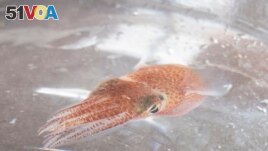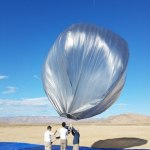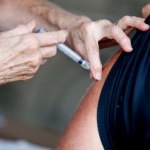28 June 2021
Some 128 baby squid from Hawaii are in space for a study.
The baby Hawaiian bobtail squid came from the University of Hawaii's Kewalo Marine Laboratory. They rode on a SpaceX spacecraft along with thousands of kilos of supplies for the International Space Station on June 3.
Jamie Foster is conducting the study as a researcher and doctoral student at the University of Hawaii under Dr. Margaret McFall-Ngai. The Honolulu Star-Advertiser newspapers reported that she studied how spaceflight affects the squid. The research, started in 1989, can help scientists learn about human health during long trips in space.

A squid is shown at a lab in Honolulu on June 11, 2021. Dozens of baby squid from Hawaii are in space for study. (Craig T. Kojima, Honolulu Star-Advertiser via AP)
Squid have a relationship with natural bacteria that help control their bioluminescence. Bioluminescence is when plants and animals naturally give off light.
McFall-Ngai is also a member of the National Academy of Sciences. She said when astronauts are in low gravity, their bodies' relationship with microbes changes. Microbes, or microscopic organisms, are very important to the human body and health.
The relationship "of humans with their microbes is perturbed in microgravity, and Jamie has shown that [it] is true in squid," said McFall-Ngai. "And, because it's a simple system, she can get to the bottom of what's going wrong."
Foster is now a professor at the University of Florida. She also works at a NASA space agency program that researches how microgravity affects the relationships between animals and microbes.
"As astronauts spend more and more time in space, their immune systems become what's called dysregulated. It doesn't function as well," Foster said. "Their immune systems don't recognize bacteria as easily. They sometimes get sick."
Foster said understanding what happens to the squid in space could help solve health problems that astronauts face.
She said the immune system does not work properly on long spaceflights. "If humans want to spend time on the moon or Mars, we have to solve health problems to get them there safely."
The Kewalo Marine Laboratory raises the squid for research projects around the world. They are about 7.6 centimeters long. There are plenty of these tiny animals in Hawaiian waters.
The squid will come back to Earth in July.
I'm Dan Novak.
The Associated Press and The Honolulu Star-Advertiser reported this story. Dan Novak adapted it for VOA Learning English. Hai Do was the editor.
Words in This Story
doctoral — adj. of or relating to the highest degree that is given by a university
perturb — v. to cause (someone) to be worried or upset
immune system — n. the system that protects your body from diseases and infections
dysregulation — n. weakness or damage in the regulation of a metabolic, physiological, or psychological process.













